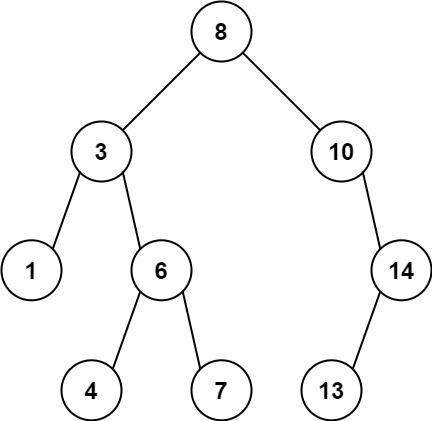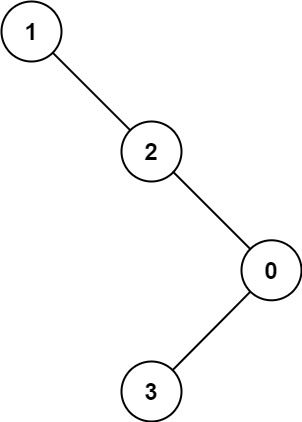Welcome to Subscribe On Youtube
1026. Maximum Difference Between Node and Ancestor
Description
Given the root of a binary tree, find the maximum value v for which there exist different nodes a and b where v = |a.val - b.val| and a is an ancestor of b.
A node a is an ancestor of b if either: any child of a is equal to b or any child of a is an ancestor of b.
Example 1:

Input: root = [8,3,10,1,6,null,14,null,null,4,7,13] Output: 7 Explanation: We have various ancestor-node differences, some of which are given below : |8 - 3| = 5 |3 - 7| = 4 |8 - 1| = 7 |10 - 13| = 3 Among all possible differences, the maximum value of 7 is obtained by |8 - 1| = 7.
Example 2:

Input: root = [1,null,2,null,0,3] Output: 3
Constraints:
- The number of nodes in the tree is in the range
[2, 5000]. 0 <= Node.val <= 105
Solutions
-
/** * Definition for a binary tree node. * public class TreeNode { * int val; * TreeNode left; * TreeNode right; * TreeNode() {} * TreeNode(int val) { this.val = val; } * TreeNode(int val, TreeNode left, TreeNode right) { * this.val = val; * this.left = left; * this.right = right; * } * } */ class Solution { private int ans; public int maxAncestorDiff(TreeNode root) { dfs(root, root.val, root.val); return ans; } private void dfs(TreeNode root, int mi, int mx) { if (root == null) { return; } int x = Math.max(Math.abs(mi - root.val), Math.abs(mx - root.val)); ans = Math.max(ans, x); mi = Math.min(mi, root.val); mx = Math.max(mx, root.val); dfs(root.left, mi, mx); dfs(root.right, mi, mx); } } -
/** * Definition for a binary tree node. * struct TreeNode { * int val; * TreeNode *left; * TreeNode *right; * TreeNode() : val(0), left(nullptr), right(nullptr) {} * TreeNode(int x) : val(x), left(nullptr), right(nullptr) {} * TreeNode(int x, TreeNode *left, TreeNode *right) : val(x), left(left), right(right) {} * }; */ class Solution { public: int maxAncestorDiff(TreeNode* root) { int ans = 0; function<void(TreeNode*, int, int)> dfs = [&](TreeNode* root, int mi, int mx) { if (!root) { return; } ans = max({ans, abs(mi - root->val), abs(mx - root->val)}); mi = min(mi, root->val); mx = max(mx, root->val); dfs(root->left, mi, mx); dfs(root->right, mi, mx); }; dfs(root, root->val, root->val); return ans; } }; -
# Definition for a binary tree node. # class TreeNode: # def __init__(self, val=0, left=None, right=None): # self.val = val # self.left = left # self.right = right class Solution: def maxAncestorDiff(self, root: Optional[TreeNode]) -> int: def dfs(root, mi, mx): if root is None: return nonlocal ans ans = max(ans, abs(mi - root.val), abs(mx - root.val)) mi = min(mi, root.val) mx = max(mx, root.val) dfs(root.left, mi, mx) dfs(root.right, mi, mx) ans = 0 dfs(root, root.val, root.val) return ans -
/** * Definition for a binary tree node. * type TreeNode struct { * Val int * Left *TreeNode * Right *TreeNode * } */ func maxAncestorDiff(root *TreeNode) (ans int) { var dfs func(*TreeNode, int, int) dfs = func(root *TreeNode, mi, mx int) { if root == nil { return } ans = max(ans, max(abs(mi-root.Val), abs(mx-root.Val))) mi = min(mi, root.Val) mx = max(mx, root.Val) dfs(root.Left, mi, mx) dfs(root.Right, mi, mx) } dfs(root, root.Val, root.Val) return } func abs(x int) int { if x < 0 { return -x } return x } -
/** * Definition for a binary tree node. * class TreeNode { * val: number * left: TreeNode | null * right: TreeNode | null * constructor(val?: number, left?: TreeNode | null, right?: TreeNode | null) { * this.val = (val===undefined ? 0 : val) * this.left = (left===undefined ? null : left) * this.right = (right===undefined ? null : right) * } * } */ function maxAncestorDiff(root: TreeNode | null): number { const dfs = (root: TreeNode | null, mi: number, mx: number): void => { if (!root) { return; } ans = Math.max(ans, Math.abs(root.val - mi), Math.abs(root.val - mx)); mi = Math.min(mi, root.val); mx = Math.max(mx, root.val); dfs(root.left, mi, mx); dfs(root.right, mi, mx); }; let ans: number = 0; dfs(root, root.val, root.val); return ans; } -
/** * Definition for a binary tree node. * function TreeNode(val, left, right) { * this.val = (val===undefined ? 0 : val) * this.left = (left===undefined ? null : left) * this.right = (right===undefined ? null : right) * } */ /** * @param {TreeNode} root * @return {number} */ var maxAncestorDiff = function (root) { let ans = 0; const dfs = (root, mi, mx) => { if (!root) { return; } ans = Math.max(ans, Math.abs(mi - root.val), Math.abs(mx - root.val)); mi = Math.min(mi, root.val); mx = Math.max(mx, root.val); dfs(root.left, mi, mx); dfs(root.right, mi, mx); }; dfs(root, root.val, root.val); return ans; }; -
/** * Definition for a binary tree node. * public class TreeNode { * public int val; * public TreeNode left; * public TreeNode right; * public TreeNode(int val=0, TreeNode left=null, TreeNode right=null) { * this.val = val; * this.left = left; * this.right = right; * } * } */ public class Solution { private int ans; public int MaxAncestorDiff(TreeNode root) { dfs(root, root.val, root.val); return ans; } private void dfs(TreeNode root, int mi, int mx) { if (root == null) { return; } int x = Math.Max(Math.Abs(mi - root.val), Math.Abs(mx - root.val)); ans = Math.Max(ans, x); mi = Math.Min(mi, root.val); mx = Math.Max(mx, root.val); dfs(root.left, mi, mx); dfs(root.right, mi, mx); } }